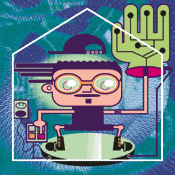D&H Says Partners Should Get In The Game
At first blush, the offering from D&H, based here, seems a bit odd: What would solution providers want with consumer games?
But more and more small solution providers are finding incremental opportunities in the home, where wireless, high-end audiovisual and security solutions, fueled by broadband access, are merging into one network.

"I was ecstatic when I heard they were offering those products," said Mike Marinelli, owner of Create Computer Consultants, a Holbrook, N.Y.-based solution provider and retail storefront that serves small businesses and a growing home-computing market.
Marinelli said he is dedicating an entire wall in his store to gaming and expects it to lead to other sales. "I should be able to pick up a lot of incremental business in wireless products, bridges, routers, accessories, cables and upgraded sound cards."
Before signing the deals with Microsoft and Sony, D&H conducted a poll on its Web site asking resellers if they'd be interested in selling gaming products as broadband and convergence reaches the home.
Seventy-six percent of those polled responded with a "yes" or "maybe," said Jeff Davis, vice president of D&H. Many of the distributor's customers Davis spoke with said they believe the home-computing market offers a new, lucrative niche.
"As more consumers get gaming consoles, they're going to need someone to tie them into the broadband and connect them to other devices," Davis said. "A lot of [consumers don't know how to do this. They'll need resellers."
D&H is touting its full line of wireless, networking and component products to complement the gaming offerings, which will be sold to resellers at competitive prices, Davis said.
While margin on the gaming consoles themselves isn't much, resellers can make money selling software and accessories, Davis said. The distributor is also adding the gaming products to its Rite2U reseller-branded e-storefronts, he said.

\
While margins on gaming consoles such as the Xbox aren't much, VARs can make money selling software, accessories.
"The [home-computing market is about $9 billion, and that's huge," Davis said, estimating that more than 1,000 D&H customers sell or have expressed interest in selling into the home market. "There's a buzz around broadband, and there's a pent-up demand for these types of products. There has always been good margin in the gaming industry."
Jeff Moody, CEO of Ping Technologies, a solution provider based in Waco, Texas, said he doesn't play in the gaming market currently but has developed a lucrative business selling Time-Warner broadband access to the SMB and home markets in his region.
But gaming products just might make sense for his business at this point, Moody added. "Now that I've heard about it, maybe I'll change my brochures to include games," he said. "We think everything in the home is moving to the network. So if it's a niche we think we can add
value to and make some money, we'd certainly give it a whirl."
Charlie Tebele, president of RCS Computer Experience, a New York-based retail shop and D&H customer that serves businesses and consumers but doesn't go directly into homes, said his gaming business has always been strong. The market seems ripe for solution providers and VARs, he said.
"It's becoming a more important market as convergence evolves," Tebele said. "If you take PCs, audiovisual and home theaters, the gaming platform will be central to that."
Constraints of the Xbox and PlayStation systems are a common problem, but D&H has often come through in a pinch, he said. "D&H is a very efficient distributor. When they get into a market, they usually get into it all the way."